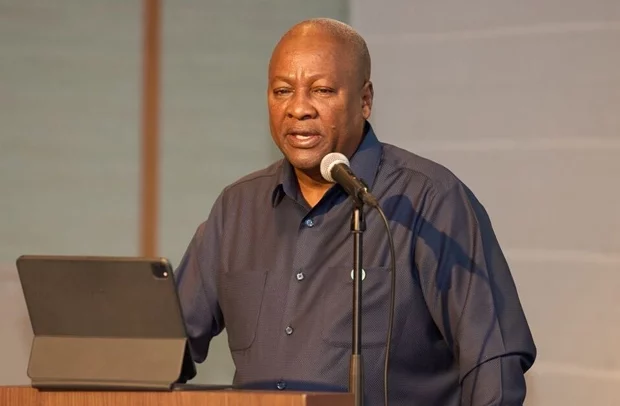President John Mahama
President John Dramani Mahama has lifted the temporary ban on the sale and allocation of state lands, declaring the move as the beginning of a reformed and accountable land administration system.
The ban, which came into effect on January 10, 2025, was imposed to allow for a comprehensive review of the country’s land governance structures.
Speaking at the inauguration of the reconstituted National Lands Commission in Accra yesterday, the President said the suspension had helped government uncover deep-seated weaknesses in the system and chart reforms to address them.
“In attracting investment, securing livelihoods, and sustaining peace, land administration is critical. Yet for far too long, our land governance has become a symbol of everything we seek to change in Ghana – confusion, conflict and expropriation. Public confidence in land governance is at an all-time low,” President Mahama said.
The President painted a stark picture of the problems that have plagued the sector, describing land acquisition in Ghana as fraught with multiple sales, endless litigation, extortion, and even violence.
He noted that these challenges were widespread, from rural communities and peri-urban areas to the national capital region.
“Nowhere is the problem more pronounced than in Greater Accra. From the illegal alienation of forest reserves in the Eastern Region to the conversion of public lands in the north, we have witnessed a national tragedy of greed, impunity and dysfunction,” he stressed.
President Mahama warned that no sector of the country’s national life was in greater need of a reset than land administration, lamenting that years of mismanagement, political interference, and institutional decay had left the system broken and vulnerable.
He added that independent anti-corruption surveys consistently ranked the Lands Commission among the most distrusted institutions in the country, a situation he described as unacceptable.
“Public lands meant for the benefit of all Ghanaians have been illegally sold, rezoned, or encroached upon with little accountability or consequences,” he said.
“The unrestrained dissipation of state lands is not the work of the ordinary Ghanaian citizen. It is spearheaded by influential individuals who hold public office not as a trust but as a personal entitlement,” he asserted.
He cited instances where prime government lands, ecological buffer zones, school reserves, forest enclaves, and even lagoons had been appropriated by those charged with safeguarding them, declaring, “This must end with this commission.”
Explaining the rationale behind the moratorium, President Mahama said the ban was intended to allow government to thoroughly examine the processes governing land allocation and identify loopholes that encouraged abuse.
“That exercise yielded valuable insights into the weaknesses of the current system and the urgent reforms that are required,” he said.
While announcing the lifting of the ban, President Mahama said all future transactions involving state lands – whether allocations, leases, or outright sales – must comply with transparent procedures, incorporate digital verification, and be subject to rigorous oversight.
He cautioned that the return to active transactions did not mark a resumption of business as usual but signaled the dawn of a new, more disciplined approach.
“The lifting of this ban must not signal a return to business as usual. It is a signal that a new disciplined era of land management has begun,” he emphasised.
He outlined four pillars underpinning the government’s reform agenda and mentioned them as restoring public confidence in land administration through transparency, fairness and justice; reversing illegal land transactions by reclaiming encroached lands and safeguarding public assets; digitising and decentralising land services for accessibility and efficiency; and harmonising customary and statutory systems to ensure coherence and equity.
The President stressed that these reforms were not optional but essential to the nation’s stability and development.
“Our ancestors taught us that land is sacred. Successive years of mismanagement have undermined this principle, but with the reforms we are initiating today, we are embarking on a bold reset of Ghana’s land governance system,” he said.
“This is not just about administration; it is about restoring trust, ensuring justice, and safeguarding the future of Ghana,” he concluded.
By Ernest Kofi Adu


